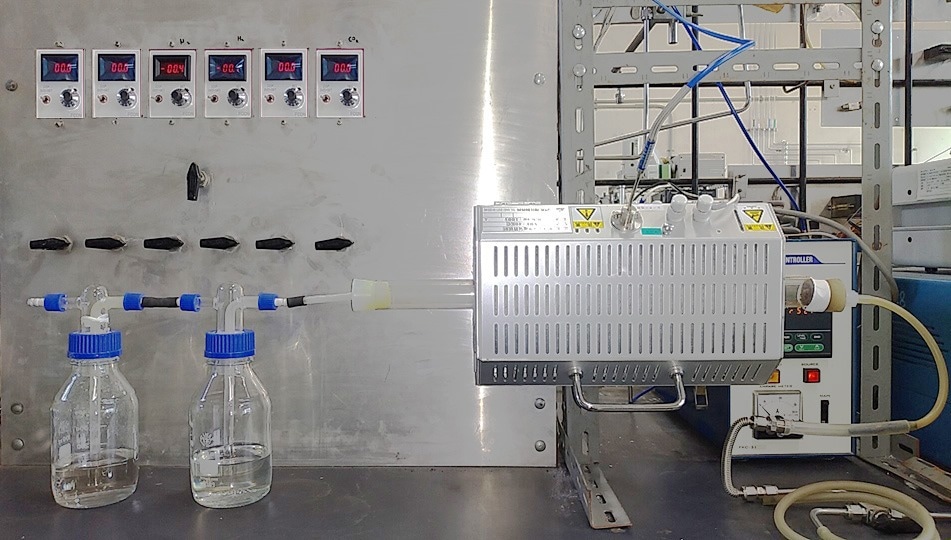Apr 29 2024Reviewed by Lexie Corner
Chemical engineers from Hokkaido University's Center for Advanced Research of Energy and Materials have developed a technique to recover phosphorous from sewage sludge by heat and chemical treatment. This may help address the declining supply of phosphorus ores. The study was published in the journal Resources, Conservation, and Recycling.
 The flow-type fixed-bed reactor is used to recover phosphorus from incinerated sewage sludge. Image Credit: Naoto Tsubouchi
The flow-type fixed-bed reactor is used to recover phosphorus from incinerated sewage sludge. Image Credit: Naoto Tsubouchi
Phosphorus, a valuable resource, can be reclaimed from the ash of sewage sludge left behind after it is burned for electricity production. Chemical engineers Yuuki Mochizuki and Naoto Tsubouchi developed the technique to recover phosphorous.
Compounds containing phosphorus are widely used in fertilizers, medications, and numerous everyday consumer goods. Currently, phosphorus is mostly obtained from phosphorus ores; however, in recent years, the industries that depend on these supplies have been under pressure due to the depletion and growing cost of high-grade phosphorus ores.
Exploiting new phosphorus resources to replace the fast-depleting reserves and establishing methods to recover phosphorus from waste streams is becoming increasingly important.
Naoto Tsubouchi, Chemical Engineer, Center for Advanced Research of Energy and Materials, Hokkaido University
Sewage sludge is abundant. It is burned in considerable quantities to produce electricity and to lower its volume. Since the residual ash is comparatively rich in phosphorus, efforts to identify effective recovery methods are growing. However, there are several issues with current methods, such as chemical contamination that necessitates additional purification and intricate, expensive chemical processing.
Hokkaido researchers have previously investigated ways to heat-treat sewage sludge to recover phosphorus and other elements like calcium, magnesium, and iron. Previous studies indicated that a viable method for recovering phosphorus in the form of heat-stable compounds could be volatilization—the process in which various elements are turned into gaseous forms and separated from the remainder of the treated ash.
As a result, the scientists investigated the volatilization behavior of the different components in sewage sludge ash under various chemical circumstances, particularly with and without the addition of carbon during a chlorine-based sludge treatment process. This made it possible to create a successful procedure that uses a mix of chlorination steps with and without the presence of carbon to separate useful compounds containing phosphorus.
The method we developed can be implemented with lower energy requirements, lower CO2 emissions, and lower cost than conventional phosphorus recovery technologies from phosphate ores. In our method, phosphorus is recovered in the valuable phosphorus chloride forms, which can also be converted to phosphoric acid by dissolution in water.
Yuuki Mochizuki, Chemical Engineer, Center for Advanced Research of Energy and Materials, Hokkaido University
“In Japan, the total amount of phosphorus contained in secondary phosphorus resources such as steel slag, livestock manure, and sewage sludge is equivalent to about half of the total amount of phosphorus brought into the country. Our next step is to study if our technique could be used to reduce the need for phosphorus imports,” Tsubouchi concludes.
The Ministry of Education, Culture, Sports, Science, and Technology of Japan (MEXT) provided funding for this study in part through two grants: one for Young Scientists (B) and the other for Challenging Research (Exploratory).
Journal Reference:
Mochizuki, Y., & Tsubouchi, N., (2024) Recovery of phosphate from incineration ash of sewage sludge by chlorination and carbo-chlorination. Resources, Conservation and Recycling. doi.org/10.1016/j.resconrec.2024.107645
Source: https://www.global.hokudai.ac.jp/